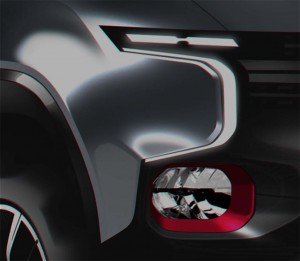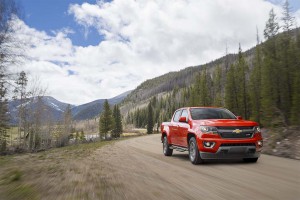Environmentalists aren’t the only ones interested in alternative power. The U.S. Army is teaming up with General Motors to run a year of extreme tests on a Chevrolet Colorado pickup designed to run on hydrogen, rather than gasoline.
The military has quietly spent several years looking at fuel-cell technology because of its potential advantages over conventional power. Among other things, it’s quiet, provides plenty of low-end torque, can generate electric power in the field, and it has a lower heat signature making it harder for an enemy to spot a hydrogen-powered vehicle using infrared glasses or sensors.
“The potential capabilities hydrogen fuel cell vehicles can bring to the Warfighter are extraordinary, and our engineers and scientists are excited about the opportunity to exercise the limits of this demonstrator,” said Paul Rogers, the director of the U.S. Army Tank Automotive Research, Development & Engineering Center, also known as TARDEC.
(Chevy Colorado Duramax gets nod as America’s most fuel-efficient pickup. Click Here for details.)
“FCVs are very quiet vehicles, which scouts, special operators and other specialties place a premium,” Rogers added. “What’s more, fuel cells generate water as a by-product, something extremely valuable in austere environments.”
Fuel-cell vehicles combine hydrogen and oxygen in a device known as a “stack,” the process creating a flow of electric current that can be used to power a vehicle’s electric motors. Some experts refer to fuel-cells, in fact, as “refillable batteries.” The only exhaust is water vapor.
Fuel-cell technology dates back more than 150 years, but only saw its first serious application in the 1960s where it was used to provide power for the Apollo moon mission. It has since become one of the potential alternatives to conventional gasoline power, with three automakers soon to be offering hydrogen-powered vehicles to the U.S. retail market.
On Wednesday, Honda rolled out its Clarity Fuel-Cell Vehicle, which will go on sale in Southern California next year. It will join the new Toyota Mirai just now going on sale in the U.S., along with the Hyundai Tucson Fuel-Cell Vehicle introduced here in 2014.
(Honda introduces new Clarity Fuel-Cell Vehicle at LA Auto Show. Click Here to check it out.)
Sales currently are being limited to Southern California due to the limited availability of hydrogen gas pumps. The Golden State hopes to have a network of pumps set up by the end of the decade.
That would be an issue for the military, as well, though getting gasoline to the front lines is also a challenge. On the positive side, a fuel-cell vehicle can run significantly longer distances on a tank – 300 miles for the Hyundai, Toyota and Honda vehicles – than most battery-cars get on a charge-up.
“Hydrogen fuel cell technology is important to GM’s advanced propulsion portfolio, and this enables us to put our technology to the test in a vehicle that will face punishing military duty cycles,” said Charlie Freese, executive director of GM’s Global Fuel Cell Engineering activities.
The Detroit maker has been working on fuel-cell technology since the 1970s, and it ran a 119-vehicle test fleet in California under its Project Driveway program using the Chevrolet Equinox SUV. Unlike its three Asian rivals, however, GM has not yet publicly announced a date for putting a hydrogen vehicle into production for the retail market.
(Toyota pushes the boundaries with extreme hydrogen car, the FCV Plus. Click Here for a closer look.)


